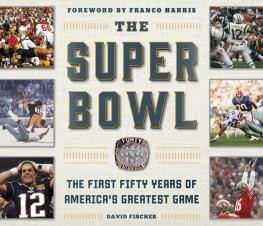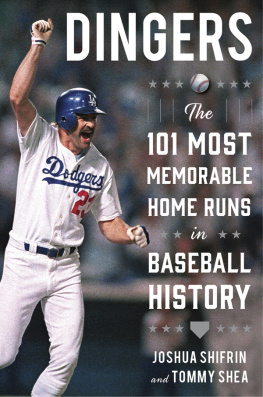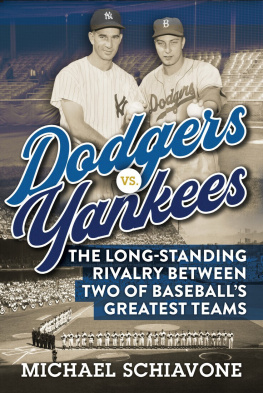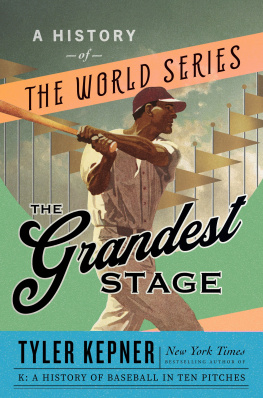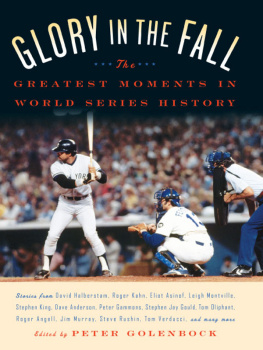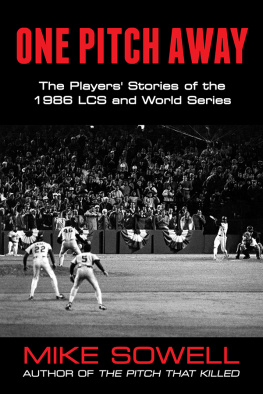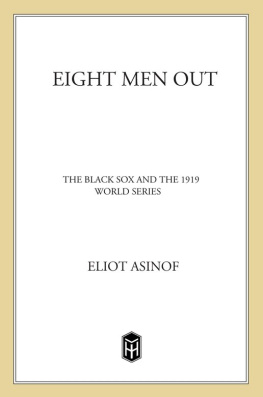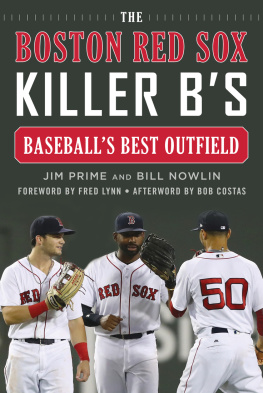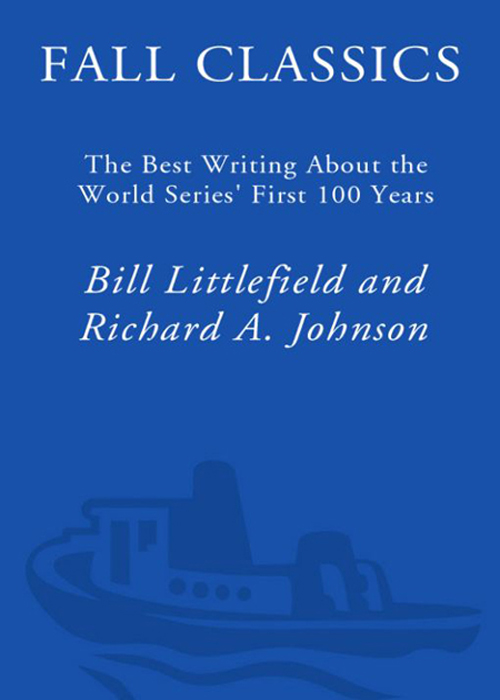
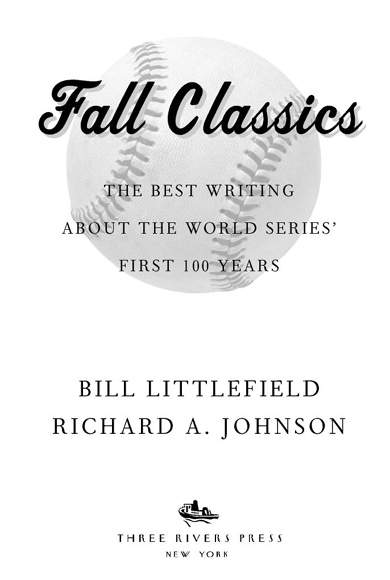
Table of Contents
To the writers whove chronicled the World Series for the past one hundred years.
Thanks for sharing the fun youve found in your work.
B.L.
To Mary, Brave and True
R.J.
Introduction

THE RUTH IS MIGHTY and shall prevail.
Heywood Broun wrote that sentence to begin his account of the second game of the 1923 World Series between the New York Yankees and the New York Giants.
How did he write the next line? How did he do it?
You can ask how any pitcher ever works up the nerve to throw a strike to Barry Bonds, or how any hitter convinces himself to stand in against Randy Johnson. Me, Im still wondering how Heywood Broun found strength and discipline enough to remain seated and typing after he tapped out that lead.
How could he not have been afraid hed ruin it?
The material in this book is characterized by great first lines. There are plenty of great last lines, too, and some sustained passages so lyrical that when you read them, you may find yourself imagining an unlikely muse... one partial to cramped spaces and cigar smoke.
Of course, not everything in the collection was written in the press box. Roger Angell is only the most recent excellent writer to have figured out that although its terrific to be there, and that writers who wrestle deadlines to submission are admirable, the World Series recollected in tranquillity works pretty well as a subject, too.
Any competition lasting one hundred years is bound to give us heroes, and they are here. Don Larson, Reggie Jackson, Bill Mazeroski, Kirk Gibson, Willie Mays, and so on. There have also been goats, of course, and the World Series has also provided us the sweet sentiment of Walter Johnson finally winning, the terrible irony of Ted Williams failing in the only shot he got, and the unlikely tales over the years of a couple dozen guys youd never have heard of if they hadnt punched a single through the infield or snatched a ball out of the air when everybody was watching. (Consider Tony Kornheisers piece on the 1985 World Series. It begins: Biancalana.)
And the World Serious, as Ring Lardner liked to call it, has given us more. Though the point of baseball is supposed to be scoring more runs than the other guys, the most fascinating Series in terms of the stories it produced was one in which at least six and perhaps as many as eight players on the White Sox were working to make sure their team didnt fall ahead of the Reds. Ah, America. If there had never been a World Series in which the greed and penuriousness of an owner drove bitter, gullible workers to sabotage the product at the urging of duplicitous gamblers who escaped persecution while tyrannous, arbitrary authority crushed the workers despite their vindication by the courts, surely somebody (Nelson Algren? Philip Roth?) would have invented one.
Long before there was the Super Bowl, the NBA Championship, the Final Four, or the World Cup, there was the World Series. That matters, too. When it began, men in derby hats satsometimes on the grass in the outfield so that the take would be greaterand marveled at the genius of John McGraw. When the Boston Red Sox made the Series (five times between 1903 and 1918), the mayor of the city led a hooting and tooting musical aggregation calling itself the Royal Rooters through the citys streets and into the ball yard. Back in the days when the Series was played on weekday afternoons, the event was a license to skip school or smuggle a transistor radio into class. Generations of fans recall October afternoons when favorite teachers put aside lesson plans and invited everybody to watch the Series on the black-and-white TV temporarily resting between the microscopes on the scarred, black table in the science lab.
Many regard the good old days as better in every respect, but in terms of the World Series, its a shaky case. Sure, the owners and the players manifested sufficient distrust and loathing to abort the 1994 World Series, a circumstance so vile that some hysterics maintained then that the game would never recover. But back in 1904, after just one edition of the modern World Series had transpired, the aforementioned John McGraw demonstrated his contempt for the American League by refusing to allow his Giants to play its champion, so there was no World Series that year, either. Though baseball fans of the late twentieth and early twenty-first centuries may not be able to conceive of lucre poisoning the pastime before their own baseball days, there were even whispers that money (and the ways and means of apportioning it) might have figured in Mr. McGraws decision. The following season McGraw relented and the Giants, clad in brilliant new uniforms made for the occasion, met the Philadelphia Athletics. On that occasion, the players reportedly agreed beforehand to split the profits of the Series 50-50a sensible, democratic, and gentlemanly arrangement that would have each player on both clubs banned for life were it to occur today.
So much for the good old days.
Baseball fans of a certain age are as likely to have a favorite World Series as they are to have a favorite team and a favorite player. As a writer, I especially appreciated the 1986 edition, because game six gave us one of those story lines no novelist writing for anybody over the age of eight would have dared to invent. I liked the 1993 World Series a lot, too, because when the Blue Jays, known as a scientifically constructed and especially disciplined team, met the Phils, considered by some a collection of beer-bellied rejects, it gave me the opportunity to write:
The fans of the Jaysmany of themspeak Spanish
And French, also Latin and Greek;
The fans of the Phils can sometimes manage English,
That is, those of them who can speak.
Most of them only grunt on their most vocal days,
Scratch themselves, spit, and paw at the ground,
While the Jays fans play classical music and chess
And pass pt de foie gras around.
During the process of reviewing the material for this collection, I found many more reasons for treasuring Series past. I revisited the novel Blue Ruin and was amazed all over again at what Brendon Boyd had done with Sport Sullivan, who got so much less than he thought he might have gotten out of his role in fixing the 1919 World Series. I read Murray Kempton again, and Jimmy Breslin, and Damon Runyon and felt lasting gratitude to the World Series for being a big enough deal to draw the attention of writers of such genius. I hope this collection will be as much fun to read as it was to assemble.
Bill Littlefield
1903
Pittsburgh a Winner in the First Clash
TIM MURNANE
BOSTON BEATEN BY A SCORE OF 7 TO 3
CY YOUNG IS OFF EDGE AND IS BUMPED HARD
MORE THAN 16,000 PERSONS SEE OPENING CONTEST
BOSTON THE FAVORITE IN THE GAME
SCHEDULED FOR TODAY
WITH CY YOUNG IN THE BOX AND more than 16,000 persons looking on, the Pittsburgh club won from Boston by a score of 7 to 3 in the first game in the series for the worlds championship at the Huntington Avenue grounds yesterday.
The crowd, which encircled the field, was held well back by ropes and a small army of policemen, and the best of order prevailed. Both teams received liberal applause for good work.
Next page

